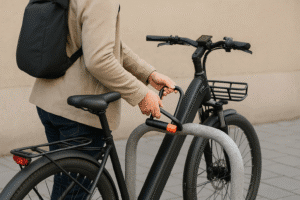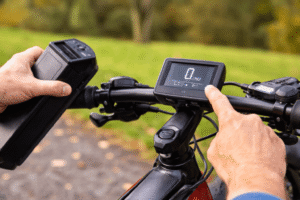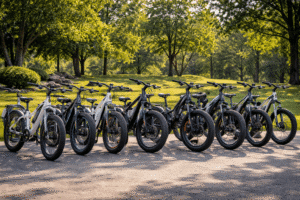E-bikes are growing in popularity across Florida, and knowing the rules helps you ride safely and legally. This guide covers everything you need to know about Florida’s e-bike laws in 2025, including where you can ride, licensing rules, and safety requirements.
Key Summary of Florida E-Bike Laws
- E-bikes are legal statewide and treated the same as regular bicycles.
- No license, registration, or insurance is required.
- Florida recognizes three e-bike classes based on speed and motor type.
- E-bikes are allowed on roads, bike lanes, sidewalks, and multi-use trails, unless restricted by local ordinance.
- Riders under 16 must wear a helmet.
- All e-bikes must have a permanent label showing class, speed, and motor wattage.
- The motor must stop when you stop pedaling or brake.
- Tampering with the motor or speed settings is illegal without updating the label.
- Local governments may have specific rules for parks, trails, and beaches.
- Electric bikes must meet federal safety standards (16 CFR Part 1512).
Are E-Bikes Legal in Florida?
Yes, electric bikes are legal in Florida and are treated the same as regular bicycles under state law. This means e-bike riders have the same rights and responsibilities as traditional cyclists.
You can ride on roads, bike lanes, and most trails unless a city or local ordinance says otherwise. Florida law clearly states that electric bikes are not classified as motor vehicles.
Electric bike riders must follow the same rules as other bicyclists. The law also gives cities and counties the authority to set their own restrictions for specific areas like beaches, trails, or sidewalks. So while the state allows broad access, it’s always smart to check local rules before heading out.
Florida’s Three E-Bike Classes Explained
Florida uses a three-class system to define electric bikes based on how they work and how fast they go:
- Class 1: Pedal-assist only. The motor helps while you pedal, up to 20 mph.
- Class 2: Throttle-assisted. The motor can work without pedaling, also up to 20 mph.
- Class 3: Pedal-assist only. The motor helps while pedaling, up to 28 mph.
This classification helps determine where you can ride and what rules apply.
Starting January 1, 2021, Florida required that all electric bikes display a permanent label showing the bike’s class, top assisted speed, and motor wattage. This labeling law comes directly from Florida Statute 316.20655.
| Class | Max Speed | Motor Type | Pedal Required? | Legal On Sidewalks? |
| 1 | 20 mph | Pedal-assist | Yes | Yes (unless local law says otherwise) |
| 2 | 20 mph | Throttle | No | Yes (unless local law says otherwise) |
| 3 | 28 mph | Pedal-assist | Yes | Usually restricted from sidewalks |
Where Can You Ride an E-Bike in Florida?
E-bikes are allowed in most of the same places as regular bicycles across Florida.
Here’s where you can ride:
- Public roads and highways
- Bike lanes and paved shoulders
- Multi-use trails and shared paths
- Sidewalks (unless restricted by local ordinance)
However, local governments can set their own rules, especially for parks, beach paths, and nature trails. Always check city websites or posted signs for specific guidance.
Read more: California E-Bike Laws
Do You Need a License, Registration, or Insurance?
No, Florida does not require a license, registration, or insurance for electric bikes.
This is a major difference from mopeds or scooters, which do require some form of registration or driver’s license. With e-bikes, riders enjoy the freedom of bicycle-level access without needing a motor vehicle license or paying insurance premiums.
Under Florida Statute 316.20655, e-bikes are specifically exempt from the state’s vehicle registration, license, and insurance laws.
This makes them a convenient, low-barrier option for commuting or recreational riding.
Equipment and Safety Requirements
All electric bikes in Florida must follow basic manufacturing and safety standards. According to the law, e-bikes must:
- Meet federal bicycle safety standards from the U.S. Consumer Product Safety Commission. These standards are listed under 16 CFR Part 1512.
- Have a motor that cuts off when you stop pedaling or hit the brakes.
- Include a visible, permanent label showing the e-bike’s class, speed, and wattage.
While there is no statewide age limit for riding an e-bike, helmets are required for anyone under 16. Older riders are encouraged to wear one, especially when riding in traffic or at higher speeds.
If you plan to ride at night or during low-light hours, be sure your e-bike has a working front light and rear reflector. It’s not just smart, it’s required by law for visibility and safety.
Are There Age Limits for Riding an E-Bike in Florida?
Florida does not set a minimum age for riding an e-bike, but helmets are required for riders under 16.
This means children and teens can legally ride electric bikes, but anyone under 16 must wear a properly fitted helmet at all times while riding.
The helmet rule is designed to reduce the risk of head injuries in case of a fall or crash.
Even though there’s no statewide age restriction, parents should consider the type of e-bike, its speed, and the child’s ability to handle it safely, especially with Class 2 or Class 3 models.
Local rules may also apply in some cities, so it’s best to check before letting younger riders hit the road.
Can You Modify Your E-Bike?
You are not allowed to modify your e-bike’s motor or speed settings unless you update the classification label.
According to Florida electric bike law, tampering with an electric bike to increase its speed or alter how the motor engages is prohibited, unless the required label is also modified to reflect the changes.
This includes changing wattage, removing speed limits, or bypassing pedal-assist systems.
Modifying your e-bike without updating its classification could result in it being treated as an unregistered motor vehicle, which comes with legal and safety risks.
To stay within the law, always follow manufacturer guidelines and avoid aftermarket modifications that change the bike’s core performance features.
Final Words
Florida has some of the most bike-friendly laws in the country when it comes to electric bikes. Whether you ride for fun, fitness, or commuting, knowing the rules helps you stay safe and legal on the road.
To sum it up: Florida treats e-bikes like regular bicycles, requires no license or registration, allows riding on most roads and sidewalks, and enforces clear rules on age, helmets, and equipment.
Just be sure to check for any local restrictions before riding in parks, on trails, or along beaches.
FAQs
Are e-bikes allowed on sidewalks in Florida?
Yes, e-bikes can be ridden on sidewalks unless a local city or county ordinance says otherwise. Riders should always yield to pedestrians.
Can kids ride e-bikes in Florida?
Yes. There is no minimum age to ride, but anyone under 16 must wear a helmet while on an electric bike.
Can you ride an e-bike on the beach or trails in Florida?
It depends on the local rules. Some beaches and trail systems allow e-bikes, while others restrict them. Always check signs or local government websites before riding.
Do I need a license or insurance for my e-bike in Florida?
No. You do not need a driver’s license, registration, or insurance to ride an electric bike in Florida. E-bikes are legally treated like bicycles, not motor vehicles.
Al Amin Morshed is the founder of BoltBikers and a seasoned e-bike reviewer with years of hands-on experience testing electric bikes. As a long-time e-bike enthusiast, he combines real-world riding insights with in-depth research to create honest, helpful content for riders of all levels. Through BoltBikers, Morshed aims to make e-biking more accessible, practical, and enjoyable – whether you’re a new rider or a daily commuter looking for the best gear.








